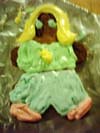The first time I read The Golden Compass, I believe I was in elementary school. There is no doubt that I was too young to understand the complex philosophical arguments being thrown around, couldn’t possibly wrap my head around theories of elementary particles and Original Sin. I think mostly my reaction was “OMG, I want a little animal to follow me around all the time and change and be awesome and…” Sue me, I was ten.
Now, a little older and slightly more educated, I’m better able to understand the religious and philosophical ramifications of the novel—and it’s become one of the most terrifying books that I have ever read.
A little synopsis: Our protagonist is Lyra, an 11 year old living in what appears to be a steampunk London. Her world is very similar to ours, though seemingly canted a little to the point where our bedrock institutions seem unrecognizable. The Church has fragmented, outsourcing its thoughts and religious research to private third-party companies. In the midst of this, intrepid and brash Lyra sets off on an adventure to the far north to rescue children stolen by a shadowy group called the Gobblers.
It’s not the plot that bothers me so much; it’s the machinations that drive the plot. Religion mixes with science mixes with religion, tumbling over and over again until it’s impossible to separate the two unlike parts. And, like always, it is the children who are caught in the middle.
Without going into the complexities of the human/daemon relationship, perhaps the simplest way of explaining a daemon is that it is a human’s soul. In Lyra’s world, humans are accompanied everywhere by animal familiars who reflect the deeply held emotions within a person’s heart. Separation from the daemon is painful and potentially deadly, leaving the severed person more zombie than human. The Church severs kidnapped children to prevent them from Original Sin; Science uses the energy created from separating child from daemon to eliminate death. In both cases, children are used as sacrifices.
What bothered me on a deep level was the extremism. I hate extremists in whatever environment they choose to settle in—religion (complete with its flipside, militant atheism), government, science. The inevitable outcome is criminal short-sightedness, an urge to do the right thing and only creating evil. Sure, the Church wishes to banish Original Sin and Science wants to eradicate death, but to what end? And does it justify the suffering of innocents?
The Golden Compass shines a light on this strange dichotomy through the lens of young adult fiction. Yet, I feel that it takes an adult, with all of his or her experience, to truly fathom the depths to which humans can sink in the name of G-d or knowledge. And if there is a kid in elementary school reading this right now who understands, then I pity him.
Sunday, March 07, 2010
Subscribe to:
Post Comments (Atom)








No comments:
Post a Comment